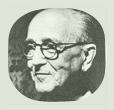
Born in Prague in a family of Jewish origin, he studies in Vienna. Result of intense research activity developed for the doctorate and habilitation his book Capital Problems of the theory of law and state treaties from the theory of rule of law (1911), anticipating what was to be the method is "legal "or" normative "he proposed. In 1919 he obtained the chair of constitutional and administrative law at the University of Vienna and participated in the drafting of the new Austrian constitution, proclaimed in 1920.
In 1921 he was appointed for life by the Austrian Constitutional Court judge. As a global synthesis of his thinking in 1925 published his General Theory of State. Called to the University of Cologne as professor of international law, is removed in 1933 and moved to Geneva, where he remained until 1940, when he emigrated to the United States. Works at Harvard University as a research associate. In the same university he teaches as lecturer, as well as at Wellesley College and the University of California (Berkeley). In 1945 the latter appointed him professor for teaching and research in "international law, general theory of law and legal institutions origins." The same year sees the third light overview of the legal conception of Kelsen, his General Theory of Law and State, and he is appointed "counsel" of the Commission of the United Nations war crimes. Die in Orinda (near Berkeley).




